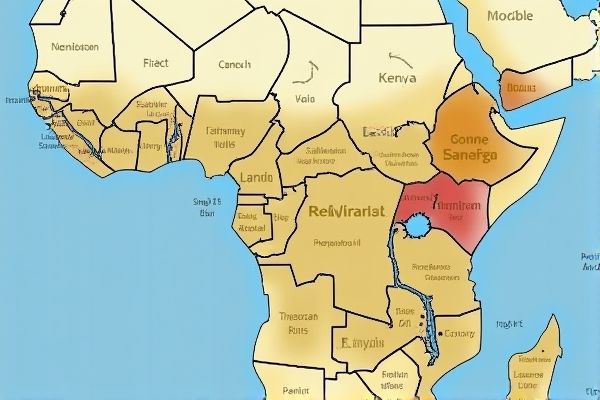
Kenya offers a range of job opportunities in Geographic Information Systems (GIS) across various sectors such as environmental management, urban planning, and telecommunications. Numerous government agencies and NGOs seek GIS specialists to support their projects related to land use mapping, resource management, and disaster response planning. The growing demand for data-driven decision-making has also led to openings in the private sector, with companies leveraging GIS technology for market analysis and logistics optimization. Networking through platforms such as LinkedIn and local GIS conferences can enhance your chances of securing a position in this dynamic field.
Job Description
GIS jobs in Kenya involve leveraging geographical information systems to analyze spatial data, contributing to urban planning, environmental management, and resource allocation. Positions often require proficiency in GIS software such as ArcGIS or QGIS, along with strong analytical skills to interpret data effectively. Employers seek candidates with knowledge in data collection techniques, remote sensing, and cartography to assist in various projects across sectors like agriculture, transportation, and conservation. Opportunities in both public and private sectors continue to grow as the demand for data-driven decision-making increases in Kenya.
Requirement
GIS jobs in Kenya typically require a strong educational background in geography, environmental science, or a related field, often necessitating at least a bachelor's degree. Proficiency in GIS software such as ArcGIS or QGIS is essential, alongside skills in data analysis, cartography, and spatial modeling. Familiarity with programming languages like Python or R can enhance your profile, making you more competitive in the job market. Employers often seek candidates with strong communication skills and the ability to work collaboratively on projects that involve various stakeholders.
Salary and Perks Expected
GIS jobs in Kenya offer a diverse range of opportunities, primarily in urban planning, environmental management, and agriculture. Entry-level positions typically have a salary range of KES 50,000 to KES 100,000 per month, while experienced professionals can earn upwards of KES 150,000. Companies often provide perks such as health insurance, flexible working hours, and professional development training. Keeping up with the latest GIS technology and tools can enhance your employability and salary potential in this growing field.
Similar Job Names
- GIS Analyst
- GIS Technician
- GIS Developer
- Remote Sensing Specialist
- Cartographer
- Data Scientist (GIS)
- GIS Project Manager
- Geospatial Data Analyst
- Urban Planner (GIS)
- Environmental Consultant (GIS)
- Surveying Technologist
- GIS Educator/Trainer
- Geospatial Information Officer
- Spatial Data Scientist
- Land Use Planner
- Geospatial Software Engineer
- Mapping Specialist
- Geographic Information Systems Manager
- Infrastructure Development Planner
- Climate Change Analyst (GIS)
Job Expectation Concept
GIS jobs in Kenya are rapidly evolving as the country embraces technological advancements in geographical information systems. Employers typically seek candidates with expertise in mapping, spatial analysis, and data visualization, highlighting the importance of relevant software proficiency, such as ArcGIS or QGIS. Strong analytical skills and the ability to interpret complex datasets are essential for roles in urban planning, environmental management, and resource allocation. Networking within local and international organizations can greatly enhance your opportunities in this growing field, as collaboration is key to leveraging GIS technology effectively.
Career Advantage and Weakness
GIS jobs in Kenya offer significant career advantages, including a growing demand for skilled professionals in various sectors such as agriculture, urban planning, and environmental management. The integration of GIS technology in government and private organizations presents abundant opportunities for personal growth and advancement. However, a notable weakness is the competitive job market, as many graduates enter the field, creating challenges in securing positions. Staying updated with the latest GIS software and technologies can enhance your employability and help you stand out in this evolving landscape.
Important Thing Must Know
GIS jobs in Kenya are expanding due to the growing need for spatial data analysis in various sectors such as agriculture, infrastructure development, and urban planning. Mastery of Geographic Information Systems software like ArcGIS or QGIS is essential, as it enables you to visualize and interpret complex geographical data. Several organizations and government agencies prioritize candidates with knowledge of remote sensing and data collection techniques. Networking within the local GIS community can greatly enhance your job prospects, as many opportunities arise through referrals and professional connections. Continuous professional development, such as obtaining relevant certifications, can further equip you with the skills needed to thrive in this competitive field.
Alternative Career Options
GIS jobs in Kenya offer various alternative career paths that can utilize your skills effectively. You might explore opportunities in urban planning, where your expertise can help in the development of sustainable cities. Environmental consulting firms often seek GIS professionals to assess land use and biodiversity, providing insights crucial for conservation efforts. Another option is to join non-governmental organizations (NGOs), where GIS technology plays a vital role in community development and resource management projects.
Companies List
- Safaricom
- Kenya Power
- Kenya Forest Service
- Kenya National Bureau of Statistics
- Geospatial Applications Limited
- H Young & Company (East Africa) Limited
- Ministry of Lands and Physical Planning
- National Land Commission
- Kenya Wildlife Service
- Deloitte East Africa
- Pan Africa Group
- Total Kenya
- East African Breweries Limited
- UN Habitat Nairobi
- World Bank Kenya Office
List of Ideal City
Nairobi stands out as the primary hub for GIS jobs in Kenya, hosting numerous tech companies and government agencies that leverage geographical data for urban planning and development. Mombasa, with its growing focus on tourism and logistics, also offers opportunities in spatial analysis to improve infrastructure and services. Kisumu's efforts in environmental management and water resource management create a demand for GIS professionals to support sustainable development. Finally, Nakuru, known for its agriculture and wildlife conservation initiatives, provides a platform for GIS specialists to contribute to the region's growth and ecological preservation.
 jobs-kenya.com
jobs-kenya.com